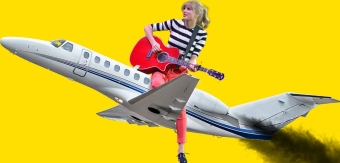This creativepool blog is a great way to find out more about the people who work in the creative industries and hear how they do what they do. My plan is, every two weeks, to chat with lots of different creative people from around the world. Today I'm thrilled that wordsmith and copywriting supremo John Simmons is in the chair.
John is director of training and brand language at The Writer, and an independent writer and trainer. He has written many books on language and communication, most recently 26 ways of looking at a blackberry. He also co-founded the writers' group 26 and this year will be heading the writing for design jury for D&AD.
John, you've written some of my favourite books on brand language. In The invisible grail you say that a lot of businesses are beaten down by their brands imagery when their real strengths lie in their brands verbal identity. What do you mean by verbal identity?
Afraid I have to go back into a little bit of history. I worked at Newell and Sorrell for many years, running a design team it was a lovely company that cared desperately for design. Then it was acquired by Interbrand, that cared less for design and often described what it did in management jargon. I got increasingly frustrated that what people meant by identity or brand was often just a visual mark a logo or symbol. Very important but how do brands communicate if they don't use words? Creative words too, not management-speak, words that connect brands and audiences.
So I invented my own bit of jargon forgive me, but it suited where I was and positioned verbal identity' alongside visual identity'. It stuck, became my job title. What I meant was the use of language to give a true feeling about what your brand is and stands for name, tone of voice, stories, verbal communications of different kinds.
In one of your books you write that words need emotion because it makes storytelling more interesting. Can't be easy trying to persuade corporate types to bring emotion into their writing?
It's a constant battle, of course. I loved what Mark Griffiths said when he was working with me at Interbrand: it's an everyday fight against meaninglessness. But I feel I'm winning the fight. When I look back now, things have shifted quite a way. Every company, every brand, now thinks about its tone of voice'. Believe me, that wasn't so 15/20 years ago. So the battleground has shifted away from the need for a brand to consider tone of voice to trying to make that tone of voice more distinctive, more individual.
The fact is corporate bodies don't write. Individuals do. And if corporations allow the individuality of voice to come through, as part of a tone of voice framework, the writing produced is livelier, more creative and more effective. There is an assumption that objectivity, the dryness of facts, is what people respond to best. So we nod that idea through especially when your boss tells you. But it's just not true. Of course you need facts to support an argument, but you need emotion to win it. My latest blog post was all about this. (http://www.26fruits.co.uk/blog/blogberry/the-direction-of-travel/)
The writers group 26 has proved to be a big success. Tell us about the 26:50 project that's currently happening.
I love 26 and when the seven of us founded it seven years ago we really had no idea what it would become. It was really just a way to get copywriters and business writers together as there didn't seem to be an interesting organisation doing that. But it's developed nicely, and I think one of the main reasons for people to join is the chance to get involved with the projects that 26 runs.
26:50 marks the fiftieth anniversary of PEN's Writers in Prisons committee. So the 26 contribution is the involvement of fifty of our writers writing fifty words that appear each day about fifty writers PEN have campaigned for. These include great writers like Vaclav Havel, Salman Rushdie, Ken Saro-Wiwa and obscure ones who deserve even more attention. The sad fact is, all around the world, writers are still being imprisoned for what they write. So 26:50 brings all those writers into the spotlight and gives the 26 writer a chance to produce a really spare but often beautiful piece of writing the kind of writing that might not be their normal bread and butter. But writing that stretches and makes you a better writer. Try this discipline of writing exactly fifty words, it's tough but it really makes you think about every word. Take a look (http://26-50.tumblr.com)
Ok. On this blog I'm asking people about the environment they work in tell us a bit about your work space?
I'm writing this at my computer, so that's unusual. I have two work rooms at home (our kids have grown up, moved out and freed up some space). One room has the computer. The other is technology-free, and that's the space I prefer. It has lots of books, a nice desk, Charles Eames chair. A good place to think and write. But actually I do a lot of writing while out and about. I wrote a chapter of The invisible grail while travelling on the tube, as a deliberate constraint. I enjoyed that and still do a long train journey, for example to Edinburgh where I often have to go, is a real pleasure and the opportunity to do a lot of writing.
I also run and find that I can write' while out running. I don't have a pen or keyboard with me but I think and have ideas. I have to keep developing the thoughts in my head while I'm out, a sort of editing process, then write the words down when I get in. Just about the only place where I now find I cannot write at all is in an office. I haven't done that, or had to do that, since leaving Interbrand.
What are you working on today?
Today I'm working on some text for a brochure for Ila, a spa company. I don't know why but I seem to have done a lot of work for spa companies in recent years. Soon I'm off to Pentagram for a meeting with PEN as Harry Pearce has been working on a new visual identity for PEN it should be introduced at the Free the Word festival in April. It's a pleasure to work with a designer like Harry Pearce who's thoughtful, respects words and absolutely committed to producing beautiful work.
What would you say has been your biggest writing challenge so far?
The books are always a big challenge. It can be daunting to sign the contract to deliver 50,000 words in six months' time. That's a large quantity of words but more daunting than that is the thought that this book the physical object made up of a couple of hundred pages is going to represent you. And actually it might represent you even when you're no longer around to say or write a word.
I only write a book when I have a clear idea for the book. The last one 26 ways of looking at a blackberry was an idea that sprang fully formed into my head. The idea started by thinking about a Wallace Stevens' poem called Thirteen ways of looking at a blackbird. Then the idea followed: take a typical piece of business writing and rewrite it in 26 ways (the old alphabetical obsession), each time a different constraint. I learned more from writing this book than any of my others. It gave me the chance to rewrite business text as, for example, detective fiction, a Shakespearean sonnet, the style of Barack Obama, as a haiku/haibun.
How have you've changed from the guy that first started out in this business?
I've changed in many ways in terms of craft skills, I guess, and confidence. Every writer needs self-belief because you get it knocked out of you so often. Clients will insist on wanting to change your words. I still stick up for what I've written as hard as ever but I've become more philosophical in accepting that your words can be changed, particularly if a client is paying. But fundamentally I think it's the same me inside. I often think I'm still a teenager deep down, or even a three-year-old. We all carry our emotions from those days around with us forever and we never quite lose them. At least, I don't think we should.
Where do you think creativity is right now? Better than 10 years ago or worse?
From the writer's point of view I think it's better. There's almost a creative writing industry in the business world now, as opposed to a few isolated freelance journalists and copywriters 10 years ago. You still have to fight for creativity but as you progress, as you build a reputation, it becomes easier to win the arguments. And, to be honest, you work more with people who are naturally attracted to your thinking, so you get more opportunities to take a creative approach. It's more difficult for young copywriters making their way but they will learn from every job, they'll gain stature from that and they'll come up with the ideas to feed creativity on behalf of clients. So it becomes a virtuous circle. Good work leads to more good work. And working with good people.
With all the different types of writing that copywriters do these days, what would you say is your favourite and least favourite kind of writing work?
I'm lucky because I can choose more than many writers. I don't write websites unless they're part of a bigger project. I still love writing that ends up in print a sign of my age, no doubt, but nothing beats the physical object for me. I actually think print will become more special in the coming years now that everything is so easy to put online it gives extra meaning to the book, the brochure, the object you hold in your hand. If I were to answer: what don't I do? I'd say direct mail. But people at The Writer write just about everything you can imagine, and I believe it's good not to specialize too much in case you become set in your ways.
That's fantastic John. One last question, where does your story go from here?
Tempting to say onward and upward but that would not be true. There's no getting away from the fact that we all get older and I'm nearer the end than the beginning of my writing days. I'm turning more and more to fiction and I'm enjoying writing personal pieces, stories, poetry. I'll even get back to the novels I put aside thirty years ago.
But the main thing I can do at this stage is to carry on and give something back to new writers coming along. So I'll certainly carry on training. My Dark Angels workshops (www.dark-angels.org.uk) are the best thing I do. I love seeing people transformed as writers during a few days away in a remote and beautiful place. I'll do that for as long as other people enjoy coming on the courses.
John Fountain is senior copywriter at Avvio
www.avvio.co.uk
twitter.com/Fountainjohn




